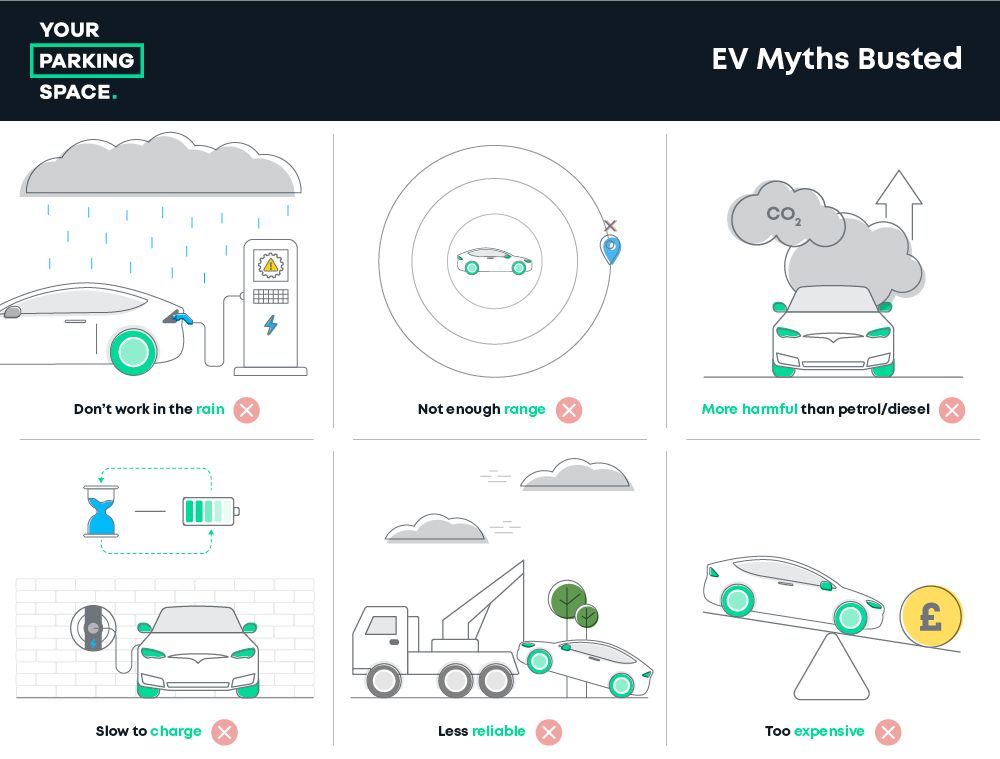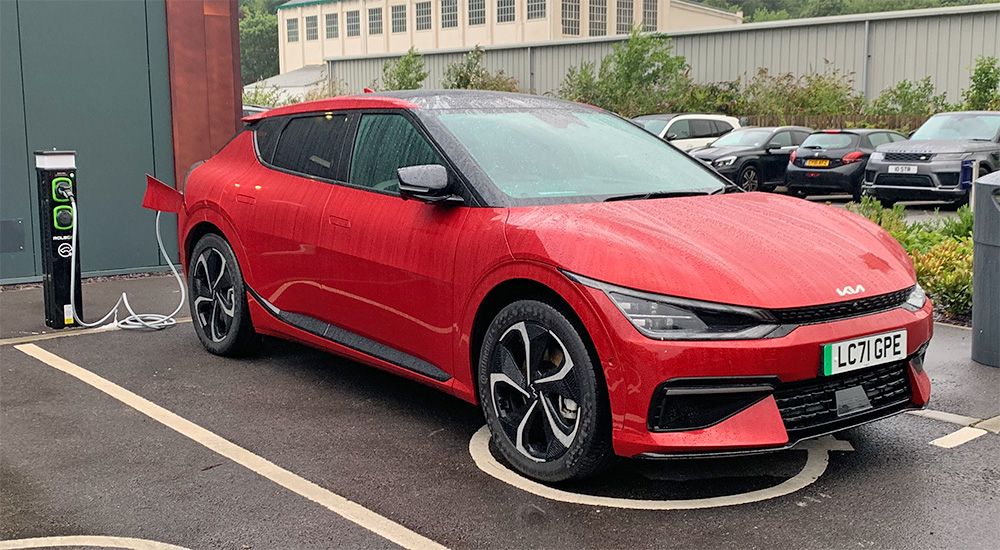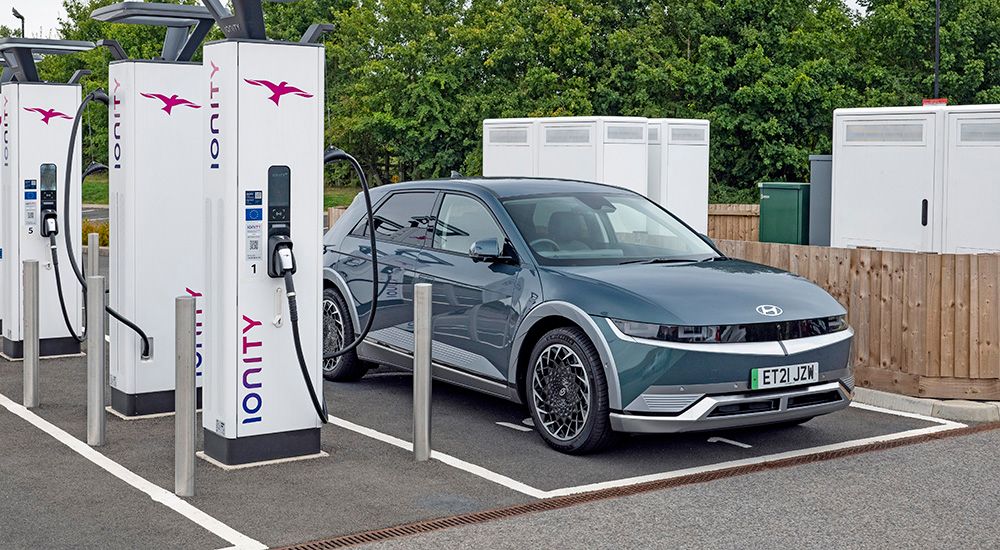YourParkingSpace banishes a few lingering myths surrounding electric cars - from the sensible to the silly - to show that an EV (electric vehicle) might be the next car for you.

Electric cars are actually more harmful than petrol or diesel models
It is certainly true that EVs are no silver-bullet, capable of solving the climate crisis single-handedly. There are clearly emissions associated with electric cars, but for those that say they are more polluting than a petrol or diesel car are simply wrong.
The majority of an EV's "emissions cost" is in the manufacturing process, primarily because of the materials and transport required for the large battery pack. As such, when an electric car rolls out of the factory, it has created more emissions to make than a petrol or diesel model.
From then on though, its linked emissions are very low, while a petrol or diesel car will constantly need to burn fuel, creating added emissions as it is used.
Even when using the average UK electricity mix - plugging into the mains - an electric car will reach the tipping point after around 36,000 miles of driving, though that's at today's UK mix. It's getting greener all the time, so expect that real-world figure to be closer to 30,000 miles - or around three years.
There is a little conjecture to that though, looking into the future as to what may or may not happen with renewables in the general electricity mix. What is much simpler - and cleaner - is to switch your energy tariff to be backed by 100% green or renewable electricity.
That way, the only emissions linked with EVs are tyre wear (similar to petrol or diesel models) and brake wear (less than petrol and diesel models because of regenerative braking). And then the tipping point comes much sooner for your EV to be greener than an internal combustion model. In fact, the more you drive it, the greener it gets.
The good news is that many public EV charging networks are backed by renewable electricity too, so it's relatively easy to stick to green electricity for much of the car's life.
The National Grid won’t cope with everyone driving electric vehicles

If every car was switched overnight to electric, then yes, the National Grid would struggle to cope with the demand for electricity. But that is simply an impossible situation, and the switch to EVs will be gradual. There will still be petrol and diesel cars on the road long after the 2035 new car regulations after all.
With a transition measured in years rather than days, there is already capacity in the grid to deal with a complete switch to electric cars - and that's coming from the National Grid.
While there would be more demand than current capacity, smarter charging, vehicle-to-grid charging, and energy storage solutions - domestic, commercial, and industrial - will help improve capacity and smooth out the peaks and troughs in demand that are so dramatic in the way we currently use electricity.
In fact, electric cars could play a big part in switching more of the UK's electricity generation to renewable sources, as they provide mobile energy storage in effect, capable of taking excess supply, and using it at a later time.
Electric cars are slow
Wrong. The days of electric cars being slow, plodding milk floats are long behind us. Instead, EVs can often be some of the fastest cars on the road, even for small city cars.
The reason behind this is because of the natural characteristics of the electric motor. Torque is available instantly, from one rpm, whereas a petrol or Diesel engine has to get up to speed - often towards the top of the rev range in the case of petrols - before all the torque is available.
As such, EVs will often be quicker over short sprints, and all proper electric cars (rather than quadricycles) will get up to the UK speed limit. Most are perfectly comfortable at 70mph too, with only the oldest perhaps feeling stretched at motorway speeds.
Many EVs will give you a shove in the back at full acceleration that is only possible in petrol cars when you get to performance models.
You can't drive an electric car in the rain

This one may surprise people, but some think that electric cars can't be driven in the rain. Or they can't be washed. Alright, electricity and water doesn't mix well for people, but an EV's electrical systems are well protected from the elements and water, so you can use an EV in any situation you would normally use a petrol or diesel car.
It's even fine to charge in the rain, with enough protection from water to make sure things are safe for drivers. Obviously, try and be careful, don't pour water deliberately into the charge port, or plunge an EV into a pond, but essentially, EVs and water are fine.
EVs don't have enough driving range
This is a little subjective, but there are electric cars available for the majority of the UK population's mileage needs. Although driving range is seen as a big issue for many, it's worth remembering that the average daily mileage is only 18 miles. Even the smallest, oldest EVs would cope with that distance a few times over.
Modern EVs would complete two or more weeks' worth without needing charging, but with occasional top-ups, EVs will comfortably deal with most situations for most drivers.
Longer trips are a different matter, but it's rare that drivers will cover more than 300 miles in one go, and that's available with even mass-market models with a single charge. There are increasing numbers of EVs available that will cover 350 miles or more without a charge required.
However, driving constantly at 70mph for three hours is 210 miles, by which time the driver should take a break on safety (or comfort) grounds anyway.
Electric cars are slow to charge

It's true that putting an electric car on charge using a three-pin plug from empty will typically take around 22 hours from empty - from 0%-100% for a 50 kWh battery. But EV drivers don't tend to use three-pin plugs to charge other than in desperate circumstances.
On top of that, very rarely will a driver charge from 0% or 1%. Charging on a typical 7 kW home unit - as many EV drivers will - from around 20% to 80% or 90% - it will take around five hours.
This is clearly far longer than the five minutes it takes to fill a tank of fuel, but a reset in thinking is required for EV charging. Whereas a petrol driver will need to head specifically to a petrol station for fuel - which may be exactly on route, or may need a slight detour. For those able to charge at home - which isn't everyone, granted - they return home of an evening, take 20 seconds plugging in, and then forget about the car until morning.
As for public charging, there are High Power Chargers installed in many places across the UK that, with the fastest charging cars, will top-up from 10%-80% in 18 minutes - adding more than 200 miles or range.
Electric cars are too expensive
It's true that electric cars are more expensive than a comparable internal combustion model, but costs are getting closer and closer. It's important to remember that the that looks at the OTR price, which very few drivers pay. Most new cars these days are bought on PCP or leased, where the cost is broken down to monthly payments.
When looking at total cost of ownership- car, fuel, insurance, tax, maintenance, etc. - electric cars will usually cost less each month than a rival petrol or diesel version. For those looking at EVs in this way, it can make a more sensible financial decision.
EVs are less reliable

Electric cars have certainly been around for a shorter amount of time than petrol and diesel cars, so knowing precise details about long-term reliability can be tricky to find. We do have some EVs that have been around for eleven or more years now however, which is certainly a significant amount of time to judge reliability.
And in general, EVs are more reliable than internal combustion engine cars, largely because there are fewer things to go wrong. The key component of a petrol or diesel car is its engine, which requires oil for lubrication, cooling systems, and involves thousands of tiny explosions every minute when it's running. An electric motor has no explosions, often uses contactless brushes to spin so has much less wear and tear, no oil top-ups required, and needs less cooling.
On top of that, brakes last longer because of the electric motor picking up much of the flack when slowing a car down, and tyres can last longer than "normal" ones since they are typically eco, low-rolling resistance tyres. With less to go wrong, reliability is better.






